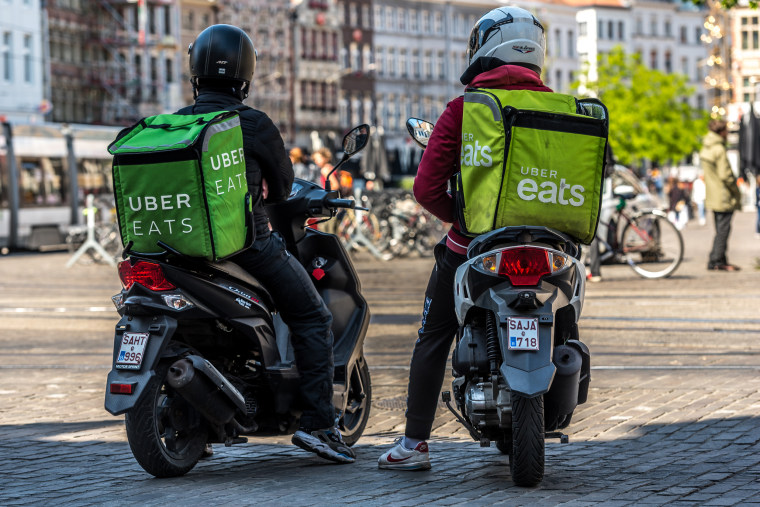LONDON — The European Union unveiled plans to improve conditions for the growing number of gig economy workers that could reclassify some as employees entitled to benefits, the latest setback for digital platforms that rely on independent contractors to deliver food and offer rides.
The draft rules outlined Thursday by E.U. officials aim to clarify the labor status of people employed by app-based companies like ride-hailing service Uber and food delivery business Deliveroo. Gig economy workers and platforms have fallen between the cracks of existing employment legislation, and the measures being considered by the 27-nation bloc, which would take years to come into force, are aimed at clearing up those gray areas.
App-based gig work platforms have boomed in the digital economy, especially during the COVID-19 pandemic when demand for food delivery services mushroomed. The apps provide short-term work for millions of people but their rampant growth also has upended traditional labor and business models, resulting in showdowns between companies and regulators around the world. Gig work’s flexibility is a selling point for many, but workers also complain that they end up making less than minimum wage after their expenses are accounted for.
Under the E.U. rules, a platform that meets at least two criteria will be deemed an “employer” and people working for that company will be reclassified as “workers” with the right to a minimum wage, paid vacation, unemployment and sick benefits, pensions and other benefits.
The criteria include whether an app decides pay levels; electronically supervises work performance; restricts a worker’s freedom to choose work hours, accept jobs or use subcontractors; dictates a worker’s appearance and conduct with customers; or limits the possibility for workers to build their own client bases or work for anyone else.
Uber says it’s committed to improving work conditions but worries about the E.U. proposal “putting thousands of jobs at risk, crippling small businesses in the wake of the pandemic and damaging vital services that consumers across Europe rely on.”
“Any EU-wide rules should allow drivers and couriers to retain the flexibility we know they value most, while allowing platforms to introduce more protections and benefits,” a statement from the ride-hailing service said.
The European Commission, the E.U.’s executive branch, estimates that some 5.5 million of 28 million E.U. workers are incorrectly classified as self-employed. The bloc has taken a leading global role in cracking down on tech companies to ensure everything from workers rights to online safety.
Platforms can challenge the classification, but the burden will be on them to prove they are not employers, the commission said.
“We must make the most of the job-creating potential of digital platforms,” E.U. Jobs and Social Rights Commissioner Nicolas Schmit said. “But we should also make sure that they are quality jobs, that don’t promote precariousness, so people working through them have security and can plan for their future.”
The proposed E.U. rules are another blow for gig economy companies in Europe. New laws or recent court rulings in Spain, the Netherlands and Britain require food delivery riders and ride-service drivers to be given employee status rather than classified as self-employed freelancers.
In contrast, the balance has tipped the other way in the U.S., where Uber and other app-based services avoided an attempt in California this year to classify workers as employees.
The European Commission also wants to force gig work platforms to be more transparent about the algorithms used to manage workers so they can better understand how jobs are assigned and pay is set. People should oversee the algorithms and workers should be able to appeal any automated decisions, it said.
